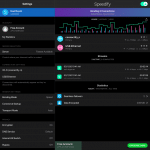AI alone isn't enough to thwart cyberattacks

Crowdsourced security platform Bugcrowd has released a new report which shows that 78 percent of hackers on its site say AI-powered cybersecurity solutions alone aren’t enough to outmaneuver cyber attacks over the next decade.
The 2020 Inside the Mind of a Hacker report also reveals that 87 percent say that scanners can’t find as many critical or unknown assets as humans.
Is Twitter losing the right?
US taxpayers think filing returns online is risky -- but they do it anyway

Thanks to the COVID-19 pandemic and extended tax filing deadline for 2020 its likely that people will be submitting their returns over a longer period this year.
New research from information security company Shred-it shows that most Americans file their tax returns online, even though many believe this puts them at greater risk of fraud.
Australian government targeted by 'state-sponsored' cyber attacks

Australia's Prime Minister, Scott Morrison says the country's government and institutions are being targeted by sophisticated cyber attacks.
The attacks are said to be against all levels of governments as well as services and businesses. Although identified as a state-based attack there is no official comment on who might be behind it. Morrison says it's believed to be a state attack, "...because of the scale and nature of the targeting and the trade craft used."
New solution helps enterprises handle sensitive data

When looking at adopting a SaaS solution a big concern for enterprises is the risk involved in sending data out to be managed, stored, processed, and analyzed by a third party.
Code analysis and debugging specialist Rookout is launching Data On-Prem, a solution which gives large enterprises the ability to quickly solve complex problems involving sensitive data.
Small and medium enterprises more likely to adopt cyber insurance

Smaller and medium sized companies are more likely to spend on cyber insurance than their larger competitors according to a new report.
The study from US cyber insurance specialist Cowbell Cyber finds 65 percent of SMEs are planning to spend more on cyber insurance as part of their resilience plan in the next two years, compared to 58 percent of large companies.
AttackIQ offers free cybersecurity training to boost 'threat-informed defense'

Breach and attack simulation solutions company AttackIQ is offering advanced cybersecurity training with a modularized curriculum and cyber range labs to security practitioners, free of charge.
Learners at the AttackIQ Academy get realistic, hands-on experience via cyber range labs and exercises that are based on scalable, cloud-hosted infrastructure. All Academy participants are eligible for (ISC)2 Continuing Professional Education (CPE) credits.
Test automation is the future -- but not just yet

In a new survey, 55 percent of respondents say test automation would improve software quality, and 51 percent say they're releasing software updates daily or weekly.
But the study of over 350 software testers from mobile testing platform Kobiton also shows automation initiatives are still in their infancy, with 58 percent of survey respondents saying their automation programs are relatively new or at least six months from starting.
Open services leave business networks exposed

As cloud environments become more and more common the extra risks are mostly well understood but a new blog from Orca Security shows that businesses could be leaving their networks open via common configuration errors.
The use of external CI/CD (continuous integration/continuous delivery) services means access control lists (ACLs) are often changed but this can inadvertently leave internal services open to the world argues Avi Shua, CEO and co-founder of Orca Security.
Business email compromise attacks spike in March

In yet another sign that cybercriminals are keen to exploit the current world situation, in the second and third weeks of March business email compromise (BEC) attacks increased more than 430 percent according to email security specialist Abnormal Security.
In the early part of the year attacks on C-Suite executives decreased by 37 percent from Q4 2019 to Q1 2020, while the focus shifted to finance employees, attacks targeting them increasing 87 percent in Q1 2020 against Q4 2019.
Speedify delivers more reliable VPN connection for remote workers

The increase in remote and home working in recent months has shone a spotlight on the unreliability of many domestic internet connections.
The Speedify VPN service is updating its offering which allows users to link and seamlessly switch between multiple connections including home internet, mobile data and public Wi-Fi networks to provide a more reliable connection.
Lockdown drives boom in mobile shopping apps

Just because people can't go out to stores doesn't mean they've stopped buying things and a new study by app marketing specialist Liftoff and fraud prevention firm Adjust shows a boom in mobile shopping apps.
Engagement has surged 40 percent, with 14.7 percent purchase rates compared to last year's 10.5 percent. Looking at data over the past two years and the trend is even more apparent, with purchase engagement up a huge 110 percent.
Half of security professionals had no plan for a pandemic scenario

New research from Bitdefender shows that half of information security professionals didn't have a contingency plan in place -- or didn't know if they did -- for a situation like COVID-19 or similar.
Yet 86 percent admit that attacks in the most common vectors have been rising during this period. Cyberwarfare and IoT as an attack vector were reported to be up by 38 percent, and APTs, cyberespionage IP theft and social media threats/chatbots by 37 percent -- all of which could turn 2020 into a bumper year for breaches.
Dark web tools spotlight dangers of poor password management

Tools like checkers and brute forcers freely available on the dark web are helping unskilled criminals launch automated attacks against organizations' websites.
A new report by Recorded Future also reveals the industries most affected by these tools are software, media and entertainment, eCommerce, finance, and telecommunications.
Security teams overconfident about detecting cyberthreats

A new report shows that 82 percent of security operations centers are confident in their ability to detect cyberthreats.
This is despite just 22 percent of front line workers tracking mean time to detection (MTTD), which helps determine hacker dwell time, and 40 percent of organizations still struggling with SOC staff shortages and finding qualified people.
Ian's Bio
Ian spent almost 20 years working with computers before he discovered that writing about them was easier than fixing them. Since then he's written for a number of computer magazines and is a former editor of PC Utilities. Follow him on Mastodon
© 1998-2025 BetaNews, Inc. All Rights Reserved. About Us - Privacy Policy - Cookie Policy - Sitemap.

